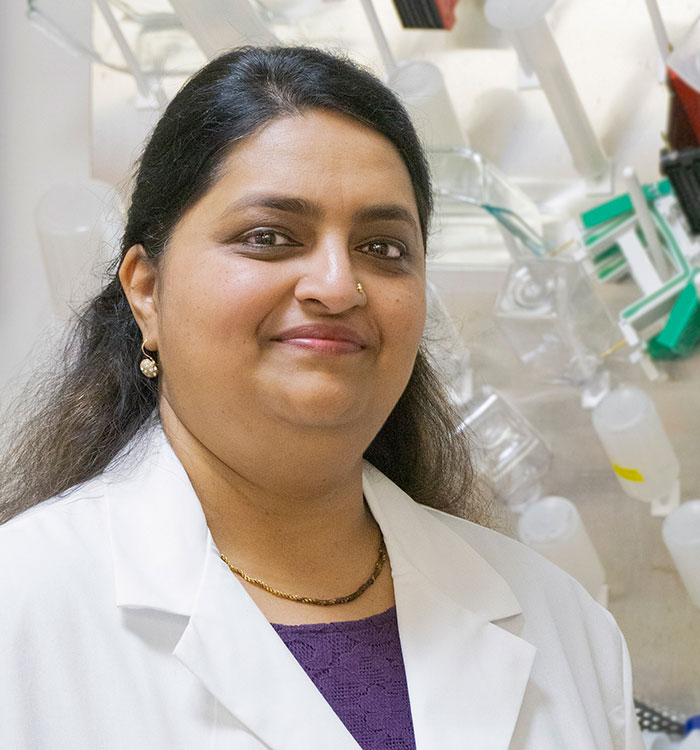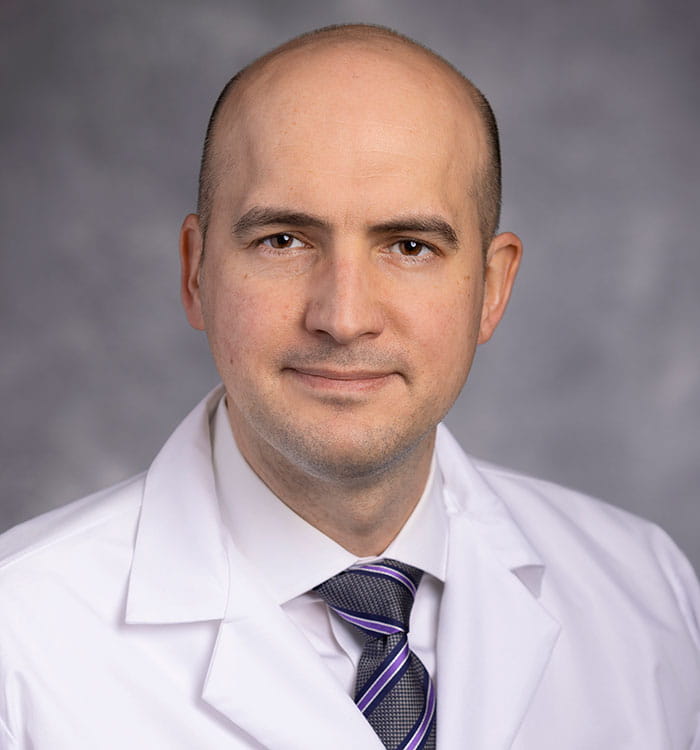Multiple Myeloma Patients at UH Seidman Cancer Center Have New Immunotherapy Option
June 10, 2024
Innovations in Cancer | July 2024
BAFF CAR T Has Important Advantage for these Patients
 Reshmi Parameswaran, MS, PhD
Reshmi Parameswaran, MS, PhDIn January 2022, a research team from UH Seidman Cancer Center and Case Western Reserve University published a groundbreaking report in the journal Nature Communications, detailing a novel approach to chimeric antigen receptor (CAR) T-cell therapy for B-cell cancers. The new B-cell activating factor (BAFF) CAR T product, developed by UH Seidman and CWRU scientist Reshmi Parameswaran, MS, PhD, and colleagues, binds specifically to each of three receptors instead of one – BAFF-R, BCMA and TACI, providing more therapeutic options and guarding against the problem of antigen escape currently found in CAR T therapies that solely target CD19. Experimental results showed that the BAFF CAR T is effective at killing multiple B-cell cancers, with robust in vitro and in vivo cytotoxicity exerted by BAFF CAR T-cells against mantle cell lymphoma, multiple myeloma and acute lymphoblastic leukemia xenograft mouse models.
Importantly, cancer cells that do not express CD19 but express BAFF receptors can be targeted with BAFF CAR T, such as multiple myeloma.
From Bench to Bedside
 Leland Metheny, MD
Leland Metheny, MDNow just two short years later, these crucial findings have reached an important new phase: A Phase I BAFF CAR T clinical trial for patients with relapsed and refractory multiple myeloma is now underway at UH Seidman Cancer Center.
UH Seidman hematologist-oncologist Leland Metheny, MD, is leading the trial at UH Seidman. He says in the two years since the foundational pre-clinical work was completed, the team has shown that it’s feasible to manufacture BAFF CAR T-cells for human subjects. The innovation is introducing genes into the T-cells via the process of electroporation in the Wesley Center for Immunotherapy.

This study is being done through an agreement between University Hospitals and Luminary Therapeutics, a biotech start-up based in Minneapolis. Luminary is an allogeneic CAR T drug development company with programs addressing B-cell malignancies, autoimmune disease and solid tumors.
Hope for Multiple Myeloma Patients
The new multiple myeloma trial at UH Seidman will proceed with up to 20 patients with relapsed or refractory myeloma and three or more prior lines of therapy, including an immunomodulatory agent, a proteasome inhibitor and an anti-CD38 monoclonal antibody.
“Our study will evaluate for a safe dose and provide the initial signal of the activity of BAFF CAR T-cells against relapsed myeloma. We will be using a manufacturing process that could be replicated in multiple academic institutions with the appropriate cellular manufacturing facilities,” Dr. Metheny says.
Its primary goal is to determine the maximum tolerated dose and recommended dose of BAFF CAR T-cells for a Phase II trial. Secondary objectives include establishing the toxicity profile, objective response rate, complete response rate, duration of response, progression-free survival, overall survival, the incidence of adverse events and the incidence of antibodies against the BAFF CAR T-cells. Dr. Metheny and the team will collect data over 24 months.
Dr. Metheny says he’s excited about the potential for the patients he treats.
“There is a persistent need for development of new, effective therapies for treatment of myeloma,” he says. Therapy with CAR T-cells has demonstrated activity against refractory myeloma. Through this trial, we are assessing if BAFF CAR T-cells can become another strategy for our patients with refractory disease.”
Contributing Expert:
Reshmi Parameswaran, MS, PhD
Assistant Professor, Department of Pathology, Pediatrics and Medicine
Case Western Reserve University School of Medicine
Member, Immune Oncology Program, Case Comprehensive Cancer Center
Leland Metheny, MD
UH Seidman Cancer Center
Assistant Professor
Case Western Reserve University School of Medicine
Financial Disclosure
University Hospitals (UH) has ownership of licensed intellectual property and equity in the sponsor of this research study, Luminary Therapeutics. As such, UH could receive financial gain from the outcomes of this research.


